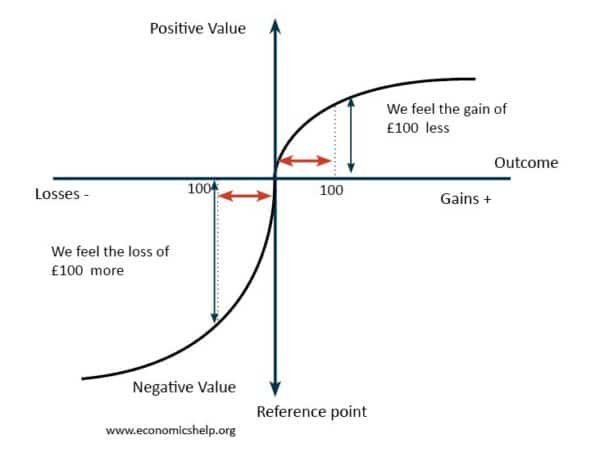Prospect theory is an economic theory which tries to describe the way people will behave when given choices which involve probability.
Prospect theory assumes that individuals make decisions based on expectations of loss or gain from their current relative position.
“An essential feature of Prospect Theory is that carriers of value are changes in wealth or welfare – rather than final outcomes.”
An important element of prospect theory is the idea that individuals are particularly averse to losing what they already have and less concerned to gain.
“Losses loom larger than gains”
Given a choice of equal probability, individuals would choose to preserve their existing wealth, rather than risk the chance to increase wealth.
Prospect theory can explain why people exhibit both risk-seeking and risk-averse behaviour.
Creation of Prospect Theory
The first instance of this theory was proposed by Daniel Kahneman and Amos Tversky in “Prospect Theory: An Analysis of Decision under Risk” (1979)
Features of Prospect Theory
Prospect theory places emphasis on how individuals frame situations and outcomes in their mind. Individuals may use rules of thumbs and the status quo bias.
- Certainty effect: People give greater weighting to certainty than outcomes that are merely probable.
- Reflective effect. In terms of positive gains, people give greater weighting to a small certain gain over a probable larger gain. But, in terms of negative gains, people exhibit risk-seeking behaviour – people preferring a loss that is probable over a small loss that is certain. (this seems to contradict the desire for insurance, but it is for moderate losses, rather than catastrophic losses.)
Model
In the editing phase, people decide which outcomes they consider equivalent, set reference points, simplification and combining probabilities.
In the evaluation phase, people compute utility based on the probability of certain outcomes, then choose alternatives with higher utility.
Prospect Theory differs from Expected Utility theory
Expected Utility theory assumes individuals will choose the outcome which gives maximum utility given the probability of outcomes.
Prospect theory allows for the fact that individuals may choose a decision which doesn’t necessarily maximise utility because they place other considerations above utility.
Related
Published 29 Mar 2018, Tejvan Pettinger. www.economicshelp.org

